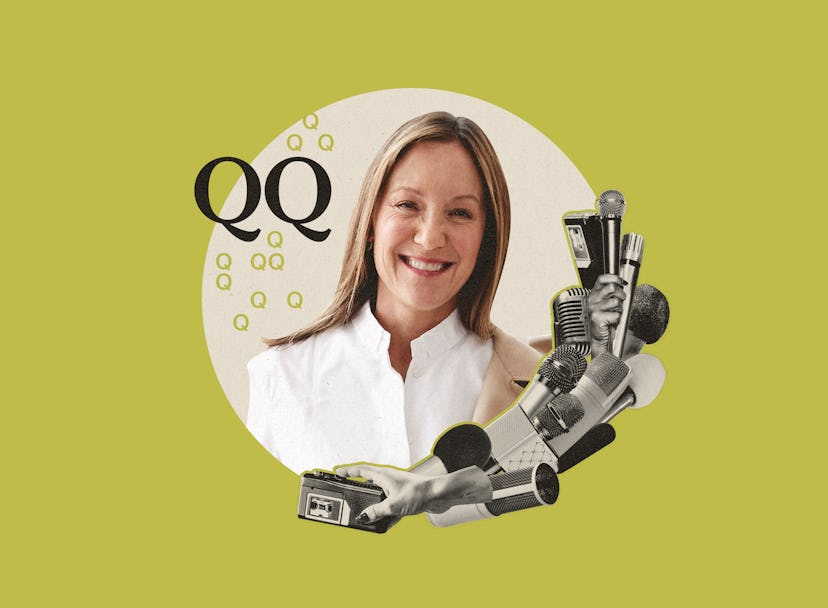Quick Question
How Beautycounter’s Gregg Renfrew Changed The “Clean” Beauty Movement
“You don’t start a big movement — you start by putting one foot in front of the other.”

In Quick Question, Bustle asks women leaders all about advice, from the best guidance they’ve gotten to how they deal with demanding hours. This week, Beautycounter founder Gregg Renfrew shares the brand’s origin story, the tasks she does (and doesn’t) handle throughout the work week, and her favorite reads.
In 2013, the cosmetics brand Beautycounter was born. With its inception, a new understanding of what it meant to create truly “clean” products reshaped the industry’s norm.
“When I started Beautycounter, ‘clean beauty’ wasn’t a phrase,” Gregg Renfrew, the brand’s founder, tells Bustle. “We defined it at the time primarily as a list of restricted ingredients.”
In today’s landscape, it’s a lot more commonplace for makeup, skin care, and even fragrance brands to be fully transparent about the ingredients they use (and don’t use), as consumers’ knowledge continues to rise. At the time, though, Renfrew sought to not only change the industry but to do right by the people in it by way of the daily products they used.
“It doesn’t matter whether you’re a technology or a beauty company — I believe that every business is, in a way, the business of people,” she says. “When I started Beautycounter, it was about helping people be safer and healthier.”
Below, Renfrew shares more about life as an entrepreneur, her passion for people, and her favorite way to wind down at night.
What initially inspired you to create Beautycounter?
It started back in 2006 when I watched the film An Inconvenient Truth, and it immediately changed my perspective on the world. It was the first time that I came to realize that things were not going well for the Earth and that I, as a human being, was contributing to those issues through my lifestyle. I started to make a lot of changes with that knowledge.
After that, I started to try to understand what was going so terribly wrong with human health. One thing that I could point to was all these toxic chemicals in the world, and they show up in our lives in a million different ways, including in our skin care and color cosmetics.
I thought, “Why am I being asked to compromise my health in the name of beauty? I want high performance and I want safety, simultaneously.”
What did those early days at Beautycounter look like?
You don’t start a big movement — you start by putting one foot in front of the other.
I had a friend who I knew worked at L’Oréal, and so I called her and I said, “I don’t know anything about the industry. Can you give me some information?” I then was introduced to the Environmental Working Group. I was just taking one step at a time, trying to understand how might I formulate products that performed as well or better than traditional brands, minus all of these ingredients of concern.
The early days were really filled with doing a ton of research, trying to figure out how this ecosystem would work synergistically.
Notoriously, the word “clean” in beauty by this point has no real definition. How do you define it at Beautycounter?
We were the first company to publicly publish our “never list” and say “These are ingredients of concern that we don’t formulate with, but also, you should just shop the market with this list so you know what you want to avoid.”
Currently, we take a comprehensive approach to clean that is inclusive of: Is our packaging sustainable? Are we no longer using virgin plastic? What does it look like up and down a supply chain? Are ingredients ethically and responsibly sourced? Are people being paid a fair wage? Are we trying to create systemic change?
What strengths do you feel you bring to the business? And what are the tasks you just don’t like to do?
I’m super passionate about people. I think that I was never the best student, but I have a high level of emotional intelligence, and I genuinely care. That was my original calling in terms of Beautycounter.
One of my main weaknesses is trying to understand the financial side of business, so I’ve always hired people around me who are really good at math and dotting the I’s.
How do you like to lead your team?
I think that for a long time, I was not a strong leader. I’ve gained confidence in age and experience.
I say oftentimes to our team members, “Is this a fall-on-your-sword moment? Do you feel strongly about this?” Because when you feel strongly about something and you’re willing to fall on your sword, almost always that person is right.
Walk me through your morning routine.
I’m pretty regimented. I wake up Monday through Friday at 6:15 or 6:30. At 6:45, I work out. I always start my day by drinking a huge glass of water. I make myself a latte with steamed almond milk. I eat the same thing for breakfast every single day: egg whites with carrots and avocado and arugula with squeezed lemon on top of it.
I tend to work well when I have a very specific routine. I think for most businesspeople, and certainly entrepreneurs, you need routine in the midst of chaos.
How do you shut your brain off after a long day?
I have consumed 17 Colleen Hoover romance novels — I love every single one of her books. I just want happiness in my life right now because there are so many things that are dark. I can read her books in an hour.
If I want to read something heavy, I might read it earlier in the day, but in the evening, I want something light.